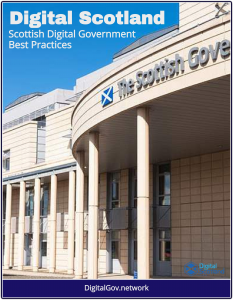AI Innovations and Adoption Resources for the Scottish Public Sector
Scottish councils are harnessing AI to transform services, from streamlining public consultations to enhancing environmental management and social care, guided by the Scottish AI Strategy’s focus on ethical and inclusive innovation.

 Scottish councils are increasingly integrating AI into their operations to enhance public services, improve efficiency, and address local challenges, aligning with Scotland’s broader vision to become a leader in trustworthy, ethical, and inclusive AI.
Scottish councils are increasingly integrating AI into their operations to enhance public services, improve efficiency, and address local challenges, aligning with Scotland’s broader vision to become a leader in trustworthy, ethical, and inclusive AI.
This vision is guided by the Scottish AI Strategy, launched in March 2021 by the Scottish AI Alliance, a partnership between the Scottish Government and The Data Lab.
The strategy emphasizes transparent, ethical AI adoption to deliver better economic, social, and environmental outcomes, and councils are leveraging this framework to implement AI in practical and innovative ways, ultimately with a goal to improve lives.
AI Register
One significant initiative is the Scottish AI Register, a publicly accessible database launched to log all AI projects used or developed by public sector bodies, including councils. This register, which became mandatory for Scottish Government departments in a phased rollout, encourages councils to document their AI systems, fostering transparency and public trust.
For example, councils are using AI to improve public services, such as optimizing resource allocation and enhancing customer query responses. The register allows residents to explore these systems, understand their applications, and provide feedback, ensuring AI is developed with community input and ethical oversight.
The Scottish Government’s use of the AI tool “Consult,” part of the Humphrey suite, to analyze responses to a public consultation on non-surgical cosmetic procedures, marks a UK first.
This tool processed over 2,000 responses, identifying key themes with near-identical accuracy to human reviewers, saving time and reducing costs while maintaining consistency and minimizing bias. Councils are likely to adopt similar tools to streamline public engagement processes, enabling faster policy development and more efficient use of resources.
Public Sector Innovation
Beyond administrative applications, councils are exploring AI to address specific community needs. For instance, AI is being piloted to improve environmental planning, forestry, and marine management, such as using AI to monitor marine mammal behavior near acoustic deterrent devices, which could enhance conservation efforts.
In social services, councils are adopting AI to support vulnerable populations, drawing inspiration from initiatives like the Scottish Children’s Reporter Administration, which has explored AI’s potential to enhance decision-making in sensitive service areas while prioritizing transparency through the AI Register.
Additionally, councils benefit from the Scottish Government’s CivTech program, which awarded £9 million in 2025 to 14 companies developing AI solutions for public sector challenges, such as detecting cancer risks among rescue workers. These innovations, supported by Scotland’s rich ecosystem of universities and tech firms, are accessible to councils for local implementation, fostering collaboration between public bodies and private innovators.
Despite these advancements, Scottish councils face challenges in scaling AI adoption. A lack of expertise, cited as a barrier by 35% of UK organizations, and high costs, noted by 30%, are significant hurdles, particularly for smaller councils.
To address this, the Scottish AI Playbook provides councils with practical toolkits, case studies, and a six-stage AI maturity framework to guide implementation. The Playbook emphasizes ethical AI use, aligning with principles like fairness, accountability, and societal well-being, and is supported by community events and peer-driven networks.
Additionally, councils are encouraged to leverage Scotland’s AI ecosystem, including partnerships with institutions like The National Robotarium, which supports the new AI Scotland transformation program announced in the 2025-26 Programme for Government. This program aims to advance AI adoption across public and private sectors, with councils as key beneficiaries.
Ethical AI Adoption
Ethical considerations and public trust are central to AI adoption in Scottish councils. The Scottish AI Strategy incorporates UNICEF’s policy guidance on AI for children, ensuring systems impacting young people prioritize their rights.
Councils are also engaging residents through the Scottish Government’s Consultation Hub and focus groups to gather feedback on AI initiatives, reinforcing a commitment to inclusivity. However, concerns about data privacy and the need for robust infrastructure persist, prompting councils to adopt lightweight AI models and explore unified platforms to reduce costs by up to 60%.
The Scottish AI Alliance’s free online course, “Living with AI” and events like the Holyrood Connect AI & Cloud Innovation Summit further support councils by raising awareness and building digital skills among staff and residents.
Conclusion
In summary, Scottish councils are harnessing AI to transform services, from streamlining public consultations to enhancing environmental management and social care, guided by the Scottish AI Strategy’s focus on ethical and inclusive innovation. While challenges like expertise gaps and costs remain, national initiatives like the AI Register, CivTech, and AI Scotland provide critical support.
By fostering collaboration, transparency, and community engagement, Scottish councils are positioning themselves to deliver smarter, fairer, and more efficient services, contributing to Scotland’s ambition to lead in ethical AI adoption.




